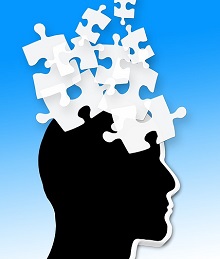Memory: Looking for an answer
by Coby
(Fair Oaks, California, USA)
I had a malignant brain tumor at age 16. I've had radiation, 2 craniotomies, radium seed implants. Nothing stopped it.

I've never been well enough to work full time but have made a living doing music and pet sitting. That is to say I have no insurance and am uninsurable. I'm just starting to investigate this issue.
Does anyone out there have an idea what to do?
Doug's Reply. I do hope some knowledgeable visitors chime in with suggestions. To leave a comment, click the "Click here to post comments" link at the bottom of this topic.
In the meantime, below are my own thoughts and suggestions on this matter. There is a multi-pronged approach to memory improvement that I think you should consider. It involves these four areas:
- Natural memory
- Trained memory
- Concentration ability
- Organizational skills
One way to look at memory is to divide it into two parts. The first, your "natural memory" is your ability to remember things without using memory aids or techniques. Through your natural memory ability, the information just comes to mind when you want it. Some people have a very good natural memory, others do not.
The second, your "trained memory," is represented by those sets of skills and habits you've learned that help you not only put information into your memory but retrieve it when needed. Anyone can learn to use memory aids and techniques, to the extent that they can remember things better than someone who has a superior natural memory but does not use the techniques.
Aside from memory itself, a third component of your ability to remember is your "concentration," also known as focus or attention span. Some people struggle with memory because they have trouble focusing, which makes it difficult for their brain to record information in the first place. If you cannot concentrate, you cannot remember.
Finally, don't overlook organizational skills. An organized person uses post-it notes, day planners, desk calendars, index cards, journals, etc. to remember tasks and appointments, record important phone numbers, make notes, and so on. You can and should use these same tools. Don't overload your brain with details that could just as easily be written down.
I. Improving Your Natural Memory
Your natural memory can be improved but there are limits. Just as a car engine can be tuned or upgraded for better performance, the brain will function better given the appropriate environment and stimulation.
Here are specific habits that will tend to improve natural memory:
1. Aerobic Exercise. Research shows that intense aerobic exercise performed regularly *stimulates the growth of new brain cells* in memory centers of the brain, such as the hippocampus. So if your doctor approves, get exercising!
2. Restful Sleep. Memories are consolidated during sleep. Take a look at your sleeping situation and habits. Make whatever changes are necessary to get at least 7 hours of uninterrupted, restful sleep every night. If your schedule allows it, take a 90-minute nap during the day to speed up memory consolidation.
3.
4. Brain Games. Certain types of brain games have been shown to improve fluid intelligence and working memory. I recommend that you spend at ten minutes, once or twice a day, playing brain games. There are over 200 free brain games on my site.
5. Meditation. Studies keep coming out showing that daily meditation can increase attention span, sharpen focus, and improve memory. Mindfulness meditation, which involves focusing on your breathing, is easy to do. Find 30 minutes to an hour every day to meditate.
II. Training Your Memory
1. Study Skills. Even if you aren't in school, you can still use the best study skills to remember what you read in books, the newspaper, etc.
2. Memory Systems. The most effective memory techniques I've ever found are memory systems such as the Peg method, Face-Name method, Phonetic Number method, Journey method, etc. Some of these techniques have been around for hundreds of years, and they work. Learn them, and use them! My favorite introductory book to the memory systems is "The Memory Book" by Harry Lorayne.
III. Improving Your Concentration
1. Brain Games. Playing brain games can improve your concentration. Computer games aren't the only kind of games that work. Find someone to play chess or checkers with. Work the daily crossword in your newspaper. Get some inexpensive puzzle books that have sudoku and other brain teaser games, and solve a few puzzles every day.
2. Vitamins and Supplements. There are a number of herbal vitamins that claim to improve concentration and other brain skills. One that I take myself is pharmaceutical-grade fish oil. There are many other brain vitamins and supplements you might want to consider.
IV. Getting Organized
1. Organization Aids. If you are not already organized, invest in a desk calendar, day-timer planner, and perhaps even a palm pilot or other electronic organizer. Form the habit of using these tools to avoid forgetting/missing appointments, important phone numbers, and so on.
2. Online Organizers. If you're on the computer a lot, consider using an online organizer. One of the best in my opinion (and the one I use) is Toodledo.com. The free version has all the features you need.
As you can see, there is no single solution for improving your memory. This is both good news and bad news. It's bad because some effort is required to explore the different avenues. It's good, though, because there are many options, and many potential habits, techniques, tools, etc., that can contribute to success.
Thanks so much for sharing your story. Having beaten and survived a malignant brain tumor, you are already way ahead of the game as far as I'm concerned. With any luck, we'll get some good comments on your question from others as well.
Best regards,
Douglas
Memory-Improvement-Tips.com
This is information only. It is not medical advice, diagnosis, or treatment.
Join in and write your own page! Return to Share Your Memory Problems Story

New / Popular
Multiplayer
Board Games
Card & Tile
Concentration
Math / Memory
Puzzles A-M
Puzzles N-Z
Time Mgmt
Word Games
- Retro Flash -
No sign-up or log-in needed. Just go to a game page and start playing! ![]()
100 Free Puzzle Printables:
Sudoku / Word Search







